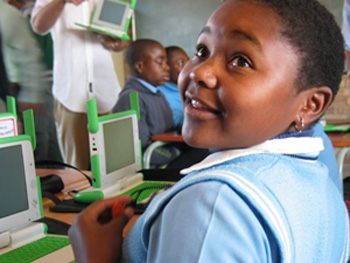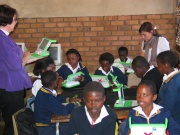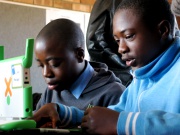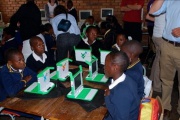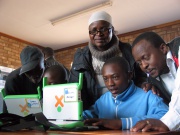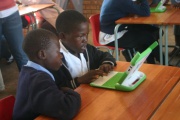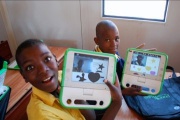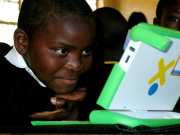OLPCorps IU South Africa
One Here...One There
One Here...One There (OHOT) is a non-profit organization driven to foster growth in sub-Saharan Africa through primary education - the best long term solution for ending the world's worst cycle of poverty, hunger, and disease. It's all about one here helping one there. Indiana University's chapter of OHOT was founded in 2006 in an effort to give students on IU's campus an opportunity to positively contribute to a pressing issue facing the world today. Indiana University's chapter of One Here... One There aims to give the youth of Haernertsburg, South Africa the opportunity to educate and empower themselves by providing them with XO laptops in hopes of closing the global educational disparity.
Members
| Name | Major | Class | '09 Team | |
|---|---|---|---|---|
| Savanah Franklin | International Studies & Economics | '09 | Yes | sabfrank@indiana.edu |
| Joe Peoni | Public Finance & Management | '10 | Yes | jpeoni@indiana.edu |
| Joe Delehanty | History, German & Economics | '09 | Yes | jdelehan@indiana.edu |
| Gordon Lang | Nursing | '12 | Yes | gorlang@indiana.edu |
| Carolyn Commons | International Studies | '12 | Yes | crcommons@gmail.com |
| Joseph Shikany | Business Management | '09 | Yes | josephshikany@gmail.com |
750 Word Draft Project Proposal
One Here...One There(OHOT) is a student organization dedicated to the proliferation of educational opportunities in sub-Saharan Africa. Our team will travel to Haenertsburg, a rural area in northern South Africa, to distribute the 100 laptops to 5th graders in hopes of further saturating our current initiative. Our team has the experience and the contacts necessary to make this project a success.
Last summer, 12 members of OHOT (four of six current team members) raised over $60,000 to purchase 150 XO laptops through OLPC’s Give Many campaign. We worked alongside 5th grade students in the schools for three weeks and created an open learning environment to adapt to their needs. We had to start from the ground up with basic ideas such as how to take care of a computer, how to type, and how to use the mouse. At the end of the three weeks, the children were exploring the internet, learning new programs, and independently teaching their peers. We established an after-school program on Wednesdays that is managed by Stanford Lake College, a local secondary school.
Successful beyond our initial hopes and goals, the project allowed us to develop wonderful partnerships in the community. Thusanang Trust, a local non-profit organization, connected us with the schools, assisted with logistical needs, and sustains the project in our absence. We have stayed in constant contact with Thusanang to ensure that the project runs smoothly and to ensure that problems are addressed in a timely manner. Another ally, Kliptown Youth Program, more specifically Neo Masilo and Sipho Dladla, provide us with ongoing technical support and will accompany us to the technical training in Kigali, Rwanda this summer. In October, we funded an XO camp at the Kliptown Youth Program, where students were given the opportunity to master XO programs and increase their understanding of the internet. To learn more about our trip to South Africa, please visit South Africa or watch a short video documenting our project: IU OHOT Documentary
Before the Rwanda summit, we will be in Haenertsburg for three weeks assessing the changes and developments of the last deployment. One of our many initiatives is to develop and fund problem profiles--multimedia presentations of students' unique experiences with issues such as File:Water at Mmaweshi Primary School.pdf, File:Lack of Sports Facilities.pdf, and File:Erosion during rainfall.pdf. South African primary students designed, developed, and produced these profiles on issues most relevant and important to their lives, not ours. These fascinating portrayals opened our eyes to a greater level of understanding on the importance of meaningful project-based learning. By funding student-led projects, we aim to empower students to become agents of change.
This summer, we want to build upon our strengths, learn from our mistakes, and create a stronger, more sustainable project. While we focused our efforts on “teaching” last summer, we learned that “teaching” is not at all what these students need. They only need to be given tools so that they can empower themselves. To give them these tools, our team will establish internet access at the third school and improve the children’s access to power by providing them with individual solar panels so that they can use their laptops at home. Due to that fact that the children will be on break from June 26, to July 20, we will be implementing this project outside of the classroom.
During the week after Rwanda, we will announce the project at the three schools, and explain to the students the opportunities they will have over their break. We are choosing to do this because when an optional learning session was hosted on a Saturday last August, more than 100 students packed in to a small room to use the laptops. From this we have learned that students in Haernertsburg are much more independent, intelligent, and driven than we could have imagined. When asked what they want to do in the future, these children responded with dreams of being doctors, lawyers, and teachers. Our team would like to administer a program that will enable them to attain their goals. We will encourage peer-to-peer learning so that the students can build off of one another, while continuing to offer our support. The after school program will continue to be managed by Stanford Lake College once we leave.
Our team is uniquely qualified for the OLPCorps because of our first-hand experience with an XO laptop deployment, our extensive support network in Haenertsburg, and our passion for educating children in sub-Saharan Africa. This opportunity will allow us to take an already successful education project to the next level.
- File:IU South Africa Letter of Support SLC-1-.pdf
- File:IU South Africa Letter of Support Thusanang-1-.pdf
- Coming: letter of support from schools
Prior Experience: August 2008 Deployment
Overview
Indiana University’s chapter of One Here…One There (OHOT), raised funds and purchased 150 XO laptops through OLPC's Give Many Campaign. 100 of these laptops were donated to three participating schools (Mmaweshi Primary School, Katane Primary School, Driehoek Primary School) in the Limpopo province of South Africa. The twelve students who traveled to South Africa played an integral role in preparing the deployment. All students raised money through personal contacts and small donations. Each student was responsible for funding a certain amount of our total budget. We spent June and July programing the laptops, getting additional funding, and working on establishing personal contact with our South African contact, Thusanang Trust. We were in constant contact with Thusanang so that we would have an idea of what to expect once we got to South Afrca. They informed us about student numbers,student demographics, language proficiency, and logistical issues such as a lack of electricity and even a lack of space (one of the schools was not yet built during our deployment). We had a group gathering in July where we worked on lesson planning, brainstormed, and learned how to use the XO. We also had an African teacher from a local high school discuss African culture and education so we would have a better idea of how to interact in the school system.
The twelve OHOT students then traveled to Haenertsburg for three weeks to work with the schools and teach the students how to use the laptops. The teachers also began training on how to use the laptops as well as how to integrate them into daily class curriculum. Locally, Thusanang Trust, and more specifically Shelley Milstein, who took on the project, helped with the distribution and much of the set-up that went along with the project. Multiple people from the Kliptown project in Soweto, Johannesburg came to help with the deployment. This included Neo Masilo, the group’s IT specialist, as well as others who were extremely valuable with their knowledge of the workings of the laptops and the local languages.
Today, the project is still going strong with the continued help from Thusanag Trust. Fears that the laptops would not last in this type of environment were dismissed with the fact that only one laptop has broken to this date and not a single one has gone missing or been stolen. The laptops are maintained with generators at the two schools which do not have electricity. There are still problems with access to the Internet, but these problems are continuously being worked on. Kliptown is still involved in the success of this deployment by continuously helping with IT problems and the maintenance or the laptops. OHOT is still funding the continuation of the project.
Challenges
| Issue | Description | '08 Action Taken | '09 Risk Mitigation
|
|---|---|---|---|
| Ownership | |||
| Time | |||
| Language barrier with children | |||
| Community buy-in | |||
| Teacher buy-in | |||
| School Resources | |||
| No Textbooks, minimal stationary | |||
| No electricity, water | |||
| Distance to schools | |||
| Perception of theft | |||
| Minimal teacher use of email system | |||
| Generational gap: technology | |||
| Maintaining high university student involvement | |||
| No telephone lines, Wifi, ADSL, 3G | |||
| No means to print projects |
Location
<googlemap version="0.9" lat="-23.911576" lon="29.913025" zoom="11" width="450" height="300" scale="yes"> -23.947665, 29.938774 -23.902654, 29.994151, Thusanang -23.895051, 29.993242, Pot and Plow -23.923839, 29.860083, Driehoek Primary School -23.908292, 29.875675, Katane Primary School -23.946206, 29.815744, Mmaweshi Primary Shool -23.909952, 29.973637, Stanford Lake College </googlemap>
Power
For our 2008 deployment, our team purchased 2 generators to supply power for Mmaweshi & Driehoek because these primary schools were off-grid. Katane, our 3rd targeted school, had power before we arrived. Originally, we had intended to use solar power; however, with limited funding we were constrained to generators. Because we were working in a rural environment, we had to design a system where petrol could be sent to the schools. We allocated a portion of our funding to cover 6 months of petrol--additional funding was provided at the beginning of the year as we evaluated the progress. With our funding, Thusanang was able to transport a container of petrol each week so the laptops could be charged.
This summer, with an already existing structure in place, we aim to provide a more sustainable alternative. We will provide students with environmentally friendly, individual solar panels. Provided OLPC has enough 10W indiv. solar panels in storage, we intend to buy those. In doing so, this will allow children to spend more time learning after school. If this option isn't possible, we intend to buy solar panels from a Polakwane-based company Thusanang has ties with. This past fall, we received funding from the Indiana University Metz Foundation to fund related power costs for our XO projects.
Internet
We were able to establish internet at 2 out of the 3 schools in 2008. Internet connection has been donated free of charge by the Tzaneen-based internet company, Procom. The third school is problematic due to its unique geographic location where it is difficult for an internet signal to reach. In order to bounce the signal from the nearest tower (Steven's Lumber Mill), it would require us to construct a new tower on a nearby mountain. In a meeting with the Procom rep, costs were estimated at ~$6,000(USD) due to its remote location and low market demand. Currently, Thusanang is working alongside Procom to determine other alternatives to reach the school. Pending our fundraising efforts, it is our goal to provide internet at Mmaweshi Primay School so that all children will be able to use their XOs to their fullest potential.
Fundraising
Fundraising is an integral part of any successful OLPC deployment. Our organization has taken the following measures to fund our projects:
Grants: IUOHOT has raised $14,900 by identifying and applying for grants that fit the mission of our project. We have found that student-led projects have an advantage over non-student-led projects because students have access to a wide range of financial resources through their universities. All of the grants that our team has been awarded have been through grant programs at Indian University such as the Metz Grant and the IU Student Association Grant. The Metz Grant will allow our team to purchase individual solar panels for the children that have XO laptops and the IU Student Association Grant will help finance travel costs for team members. We are also individually applying for several more grants through the Indiana Unviersity Hutton Honors College to cover travel and living expenses.
IU students with a valid username and password also have access to an online database of non-IU grants that IU subscribes to. We have applied for several grants through this and other grant databases, but so far have not been awarded any outside grants. It is likely that other universities have similar grant resources that would help to fund OLPCorps projects.
Private Donations: Our team has also found that private donation requests are a very simple and effective way to fundraise. Our team raised the majority of funds for our 2008 deployment, and plan to raise a portion of funds for our 2009 deployment, through private donations. It has worked best when one team member drafts a uniform donation request letter that can then be sent out to all team members. Each member then personalized their donation letters and sends them out to personal contacts who might be willing to donate. Uniform donation letters that are sent out before first being personalized are generally less successful than personalized letters. Examples of our 2008 and 2009 uniform donation request letters coming soon.
Partnering Organizations
Thusanang Trust
One Here…One There partnered with a local organization, Thusanang Trust to help ensure the success of the project. Thusanang Trust was a pivotal part of the OHOT project. They acted as an intermediary between participating schools and OHOT before the start of the project by providing OHOT with critical information necessary for deployment: student demographics, general environmental conditions, and the like. OHOT members also stayed in Thusanang's dormatories and used their facilities to charge the laptops and store them overnight until all power issues were arranged. Thusanang's Shelley Milstein took special interest in OHOT's initiative and has ensured its continued success in OHOT's absence. Since September, she has provided continual follow-up reports.
Kliptown Youth Program
Kliptown Youth Program was South Africa's first XO deployment funded by the Weber family. KYP members played an integral part in facilitating the success of our first deployment. They acted as a model for OHOT’s project as well as lent out multiple members of their team to help with IT needs and the language barrier, among dealing with unforeseen problems. Neo Masilo was our group's IT specialist. He and Sipho Dladla set up the three servers and gave lessons to the teachers on Internet use. KYP now serves as a primary support center for small grassroots deployments evolving in South Africa.
For 2009, we intend to fully fund Neo Masilo, Sipho Dladla, and our most active primary school teacher from Katane, Welhemina, to Rwanda for OLPCorp's 10 day orientation. In doing so, Masilo could provide technical support to student teams as needed, Sipho would further his technical skills, and Welhemina would further her investment in One Laptop per Child as the area's primary advocate.
Stanford Lake College
Stanford Lake College(SLC) is a prestigious local secondary school in Haernertsburg. SLC assisted with laptop instruction during our 2008 deployment and oversees a weekly after school learning session in our absense for students in Haernertsburg who received an XO. In addition, Joy Park, head of SLC's Technical Department, has taken a lead role in ensuring the project's success. Aside from leading the after school program, she continually provides technical support and training.
'08 Anecdotes
Saturday School If we were ever worried about a lack of interest from the students, the Saturday School trial proved us wrong. The idea behind "Saturday School" was to allow all students, not just the 5th grade classes, to participate and learn on the XO's. The Saturday session was a complete success: Over 100 children, ages 5-18, came. Every student was actively participating in an ideal learning environment, sharing their knowledge and working together. Saturday School definietly proved how interested and excited the local communities are.
OLPC XO Camp - Johannesburg One of our original goals was to connect XO deployments in creative ways. So, we proposed the idea of an "XO Camp" to various teachers and students to gauge a level of interest, receive feedback, and determine what they would hope to accomplish from it. Instead of organizing it ourselves, we took a hands-off approach. We decided that we would fund it if the students wanted it. Several KYP student leaders took initiative by writing a project proposal. After review, they received funding to implement the XO Camp. In doing so, they organized a weekend event at KYP between the 1st XO distribution in Soweto and the Haenertsburg primary schools. Following the camp, the organizing committee wrote a follow-up report highlighting various issues. The report & pictures can be seen here: File:XO Camp OHOT and KYP Report.pdf. -- This could not have been possible without the generous support of Larry Weber.
Documentary A critical element in forming our team was incorporating students' diverse interests. As a student organization, one of our main tenents is a freedom to pursue your interests as it relates to our mission. For that reason, we aim to pair tasks to students with related majors. For instance, Courtney Miller, a journalism and international studies student, produced a short documentary on OHOT's work in South Africa. Breaking Boundaries - Courtney Miller.
Raising Awareness to Provencial Dept. of Education Mmaweshi Primary School was gracious enough to host a joint ceremony celebrating the success of the project. There was a huge amount of local support behind the project, enough that the Head of the Proviencial Department of Education decided to look into the deployment. He came to Haenertsburg to speak at the ceremony as well as gain more knowledge about the project. Three team members met with him after the ceremony to give a brief presentation about the deployment. OHOT hopes for his continued support and an increased involvement during the 2009 deployment.
Attendance We had 100% participation at Katane primary school during the 1 month period we were working in the school.
Unexpected Capabilities One of the smartest students at Katane primary school, Thabang, one day surprised us all. We had brought with us a few wireless mice and keyboards, because the keyboards are difficult for adults to use. One day when the students were able to work on the computers with no direction, I looked over and Thabang was sitting next to another student not working on his computer. What I did not realize is that he had figured out how to use a wireless mouse, and was playing a game from across the room.
'09 Project Ideas
My XO Story Project
Our team will ask students who received a laptop during our 2008 deployment to do a creative project on their laptops reflecting on how their XOs have affected their lives. The students can draw pictures, take photos, write a story in the Story Book program, write their thoughts down in their XO journal, or any number of other possibilities. We will then compile these stories in a Wiki page so that they can be shared with other students and XO deployments around the world. It is our hope that this project will not only serve as inspiration for those facilitating future XO deployments, but that it will allow children to inspire other children. We want to see a chain reaction of students inspiring other students so that they can tap into the full potential of their laptops.
